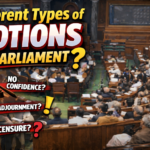Supreme Court; Preventive detention invalid if the order is delayed: Basics Explained

The Supreme Court(SC) observed that preventive detention is a serious invasion of personal liberty and all safeguards allowed under law must be adhered to.
The SC bench also set aside a preventive detention order passed in Tripura five months after the proposal for it was received. The SC also held that unreasonable delay between getting a proposal and passing an order for detention would make the order invalid; “unreasonable delay” snaps the “live and proximate link” between the prejudicial activities and the purpose of detention of a person.
‘Preventive detention grave invasion of personal liberty’ observed the bench
LEARNING FROM HOME/ WITHOUT CLASSES/ BASICS
Under Section 151 of The Criminal Procedure Code, 1973 (CrPC) preventive detention is action taken on grounds of suspicion that some wrong actions may be done by the person concerned. A police officer can arrest an individual without orders from a Magistrate and without any warrant if he gets any information that such an individual can commit any offence.
The object of Preventive Detention is not to Punish but to prevent the detenu from doing something which is prejudicial to the State. Here, the person is confined in custody without undergoing a trial.
An ‘arrest’ is done when a person is charged with a crime. An arrested person is produced before a magistrate within the next 24 hours.
In case of preventive detention, a person is detained as he/she is simply restricted from doing something that might deteriorate the law and order situation.
Art 22 of the Indian Constitution deals with Preventive Detention
Article 22(3) provides that if the person who has been arrested or detained under preventive detention laws then the protection against arrest and detention provided under article22 (1) and22 (2) shall not be available to that person.
Certain safeguards are provided in the constitution against the arbitrary use of Preventive Detention
under Article 22 (2) every arrested person must be produced before a magistrate within 24 hours after arrest.
a person may be taken to preventive custody only for 3 months at the first instance. If the period of detention is extended beyond 3 months, the case must be referred to an Advisory Board consisting of persons with qualifications for appointment as judges of High Courts. It is implicit, that the period of detention may be extended beyond 3 months, only on approval by the Advisory Board.
The detainee is entitled to know the grounds of his detention. The state, however, may refuse to divulge the grounds of detention if it is in the public interest to do so. Needless to say, this power conferred on the state leaves scope for arbitrary action on the part of the authorities.
The detaining authorities must give the detainee earliest opportunities for making representation against the detention.




0 Comments